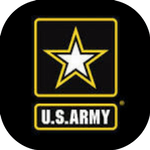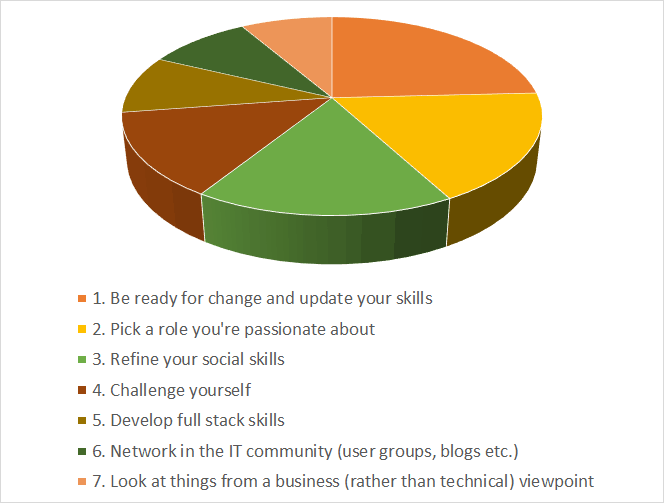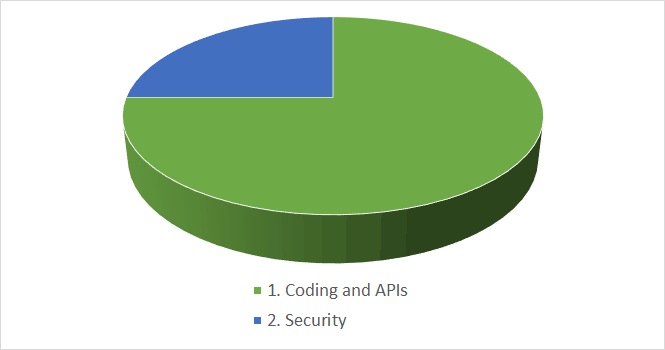

111 Industry Experts give their Best IT Career Advice
Breaking into the IT industry today is way more complicated than it used to be. When I started out, you woke up one morning with your shiny new degree or Microsoft certification and breezed into a job. Employers were queued round the block to fight for your services. Job roles were clearly defined and you could specialise in one area. ‘You’re a Windows administrator and you want to learn what the networking team do? Sure buddy, up to you!’
Today, things have changed. The jobs are still out there in abundance, but there’s more people qualified to do them. With the rise of cloud and virtualization, the lines between job roles have blurred and you’re expected to have the full stack skill set across all technologies. You need to raise your game if you want to be ahead of the crowd. But what to do? Wouldn’t it be great if you could ask the top players in the industry for their best IT career advice?
The Question
So I came up with the idea of asking industry experts this question:
"What’s the best piece of advice you could give to someone looking to start an IT career?"
It’s a monster collection of top advice that you’re going to want to dip into again so I recommend you bookmark this page.
The Main Findings
Seven specific pieces of advice, and two particular technology skills, were repeated again and again from the experts, highlighting just how important these tips are. These are the main things you want to focus on to boost your IT career. You can find out what they are in the Summary section at the bottom of the post.
If you do skip ahead to the summary, I recommend you also browse through the individual entries because there are many unique pieces of advice which are solid gold.
The Gurus
The Industry Experts. These are the influencers, thought leaders, authors, bloggers and tweeters who have their finger on the pulse of current and future trends. It’s their business to be at the cutting edge.
The Chief Technology Officers. These are the Chief Technology Officers of Fortune 500 companies who are shaping the future of the industry. They know the qualities they need in people to achieve their vision.
The University CIOs. These are the Chief Information Officers from the Time’s list of the world’s top 100 universities. Nobody has a better understanding of the situation facing new graduates as they enter the job market.
The HR Directors and Recruiters. These are the executives from the world’s largest recruitment agencies and Human Resources departments. They know the current state and future trends of the job market, and exactly what employers are looking for in job candidates.
The Flackbox Readers. I also asked my readers for their best advice, with the top three responses making it into the article. A stipulation was that it had to be a great piece of unique advice which had been missed by the other experts. The response was fantastic and I couldn’t narrow it down to three, so the best four are listed.
The Industry Experts
Ethan Banks, packetpushers.net

- From IT stack separates to converged and hyperconverged stacks.
- From localized “in office” workforces to increasingly mobile and remote workforces.
- From wholly owned infrastructure to a mix of owned and rented infrastructure from the public cloud.
Ed Tittel, edtittel.com

“The best thing any person just starting out in IT can do for themselves is to conduct a survey to explore the full extent of the profession.
I’d advise looking into membership with either the Association for Computing Machinery (the ACM) or the IEEE Computer Society.
I’d also advise trolling the big job boards such as Indeed, SimplyHired, LinkedIn Jobs and Linkup (among others). You won’t necessarily be looking for any specific job, but it will give you a sense of what jobs are available. More importantly, it will tell you what certifications are in demand, by the frequency of their appearance in such job postings.
And finally, I’d urge readers to check out GoCertify.com, a site for which I’ve been blogging weekly on certification topics for over a decade. You will find it to be a useful source for certification news and information. Readers with specific questions can email me through ed.tittel.com/contact. I can’t promise an immediate response, but I can promise such help as I can give in my available spare time.”
Duncan has a great article on how to get your IT career to the next level.


“Be hungry. Be unstoppable.
Even when I blow them off.
Even when I say, “ahhh…we don’t really need that right now.”
Be hungry. Be unstoppable.
Scott Lowe, blog.scottlowe.org
“Hone your learning skills. Three years ago, I told you to be prepared for change and cultivate a passion for learning. That advice is still applicable, but I’d now add to it and say to hone your learning skills. Understand how you learn, and what learning modes or styles work best for you.

The time you spend improving your learning skills will pay off in so many ways over the course of your career.”
Todd Lammle, www.lammle.com

“Think Python, DevNet, Automation… but start with basic network skills such as CCNA/CCNP to help you understand foundationally on what you are trying to automate.”
Amy Renee, amyengineer.wordpress.com
Always be studying, always be growing your skills, and always be challenging yourself.

Get connected with the community and others that are looking to grow their IT skills as well.”
You can follow Amy on Twitter at @amyengineer
Rene van den Bedem, vcdx133.com

Anthony Sequeira, www.cbtnuggets.com
Their enthusiasm for the subject matter can more than make up for slight variations in pay and demand.”

Dwayne Lessner, itbloodpressure

Scott Morris, smorris.uber-geek.net
“My, how times change! 2020 definitely threw us for a loop in terms of how the IT industry works! The best advice for 2021? So many quips are coming to mind, although not necessarily helpful! I would really think the answer is two-fold.
First, never stop learning. While I know this is always a good mantra to live by, it’s not always an easy one. 2020 has taught us that there is likely unexpected free time that we have on our hands, so figure out how to make the best of it. Keep existing skills relevant, and add new skills that may interest you!

Second, find ways to demonstrate that you absolutely can do (insert your IT job function here) remotely without fail. Productivity is a hard thing to quantify when people cannot see you. Not that being physically present in an office environment magically makes you productive, but many old-school management ideas revolve around the “reach out and touch someone” approach. In this COVID world, that’s not necessarily true. Be available. Be productive. Make sure people know it.
The more value that you can present, whether working remotely, traveling around or staying in an office is critical to keeping your career afloat despite the tumultuous circumstances that may arise.
While it’s hard to come up with good ideas not really having a clue what 2021 will bring, I have been following many of the predictive models watching COVID. Depending on which model you like, things will not be normal until June of 2021 or perhaps December of 2021 (or even later). So let’s assume that 2021 will be equally as “interesting” and adapt accordingly! IT is a highly flexible industry in general, so we all need to make sure we are as adaptive as the technology is!”
Ivan Pepelnjak, ipspace.net
The best way to learn something is to have to explain it to others.

- You want to know what you’re talking about. You don’t want to look like an idiot when you’re on the stage, so you will go into the nooks of this product and explore all the crazy options so you are prepared for the questions you might get.
- If you have to explain things to other people, it forces you to organise how you think about something.
- If you have to explain something to people who have no background or fundamentals, you’re forced to simplify things down or they won’t understand you. This helps give you the bigger picture and understanding of how things fit together.
Eric Shanks, theithollow.com

“Be willing to learn new things, and be prepared to ask questions. You won’t know everything, you’ll need some help, and you’re not alone.
Then, remember to pass on what you’ve learned, to others who have questions.”
Robin Harris, storagemojo.com and zdnet.com/blog/storage
“My advice is: don’t!

The existing enterprise IT model is badly broken. Personnel costs are extremely high compared to hyper scale services, so you’ll eventually spend all your time babysitting legacy apps, while the leading edge stuff will be largely managed by the cloud vendor. Fewer companies will be able to afford their own IT department, so total US – and in most developed countries – IT employment will drop. What robots are doing to US manufacturing, cloud services will do to enterprise IT.”

“My main piece of advice would be to not underestimate the importance of social and emotional intelligence.
Gav Brining, cloudbuzz.net
“Always be willing to learn new things.
The IT landscape moves so fast, when I was starting out it seemed like if you became the best at virtualisation or a storage admin you’d be set for life, but then things like automation come along and if you don’t keep learning new things you become irrelevant.”

Shawn Powers, cbtnuggets.com

“Everyone looking to start an IT career is going to focus on IT stuff. It certainly makes sense. If you’re starting a career though, the best advice I can give is to bolster that IT knowledge with Soft Skills.
Plus, learning Soft Skills (jargon word, I often hate jargon), or simply learning to effectively communicate will be of incredible help during the hiring process. Employers will see your interviewing skills as an example of what they can expect from you once employed.”
Alex Papas, www.flackbox.com

Also, always remember this is an extremely thankless line of work. No matter how innovative your solutions are or how good your problem solving is, you won’t hear from anyone until something goes wrong and they want to blame someone for it, even if it’s not your fault. If you have a thin skin, this line of work probably isn’t for you.”
Will Robinson, oznetnerd.com

“Love what you do. The main difference between an average engineer and a top engineer is passion.
Also check out Will’s post How to Land your Dream Job
Benjamin Troch, virtualb.eu
“Never burn your bridges.

Another thing is be passionate and help other people out, if you don’t like your job find something you are passionate about because a career is a marathon, not a series of sprints.”
David Marshall, vmblog.com

“In 2021, if you’re looking to start a career in IT, you might be in luck. Don’t limit yourself in your job search. What do I mean by that?
With the COVID-19 pandemic, there was a worldwide shift that took place, with more people working from home than ever before. While that doesn’t necessarily bode well for all types of work, it does provide a slight positive uptick for those in IT.
If you are looking to make a change into IT, you may not have to limit your focus to your local geographical area when job hunting. Many IT companies are now looking to hire people for various positions without requiring them to be local, since many of these jobs are allowing people to work remotely.
If you aren’t sure where to start, think security. Start studying and learning as much as you can about cybersecurity from end to end.
Working from home after the COVID-19 pandemic might be convenient for workers, and it might save on certain company expenses (think reduced real-estate/office space), but it will also bring about added security risks.
Cybersecurity was already a hot career in 2020, but in 2021, more companies are going to be hiring to fill these much needed positions. And since this area of IT is constantly evolving, it should provide a good place to land and stay for many years to come.”
Simon Long, simonlong.co.uk
“Find an area of focus that you have the most passion for.
Working in IT can be competitive and will often require you to go above and beyond others to advance.
If you are passionate about something, working hard won’t seem like hard work.”

Niels Hagoort, cloudfix.nl

Colin Lynch, ucsguru.com
“I think the best advice to someone just starting out would be to embrace the programing and automation aspects of IT.
Learn the API’s and some basic Python, and they will be in great shape and the envy of many a traditional networker with years and years more experience, but having now to learn these concepts too.”


“Developers and engineers entering into their careers need to be more prepared for the business aspects of solutions. More and more I see great minds come onboard to companies that can code like there is no tomorrow, but are missing the people skills required to best define the solutions that will provide the deepest customer and user impact.
So as you intern or while you start your first jobs, try to focus on the people that you will serve, study their challenges, and embed what you have learned into the next code masterpiece.”
Martin Glassborow, storagebod.com
“I think the advice I would give is not to pigeonhole yourself early in your journey.
It is very easy to see yourself as a developer or an infrastructure or a project manager; even within those silos, there are yet further silos.
So my advice for someone early on is to try and look for variety; it is this breadth of understanding that will bring value in the long-term. Also consider working both sides of the fence…spend time working for vendors and end-users.”

Dan Kusnetzky, VirtualizationReview.com and NetworkWorld.com
“Students of IT technology must broaden their studies to include knowing more about the business and their target company’s products. Merely understanding systems and how they work isn’t enough for the student to become a valued asset of the company.
We are seeing more use of highly distributed, highly parallel systems based upon cloud computing today. It would be wise of a student to understand how these systems work. This also means that students would be wise to understand a bit more about how intelligent end devices powered by Android, IOS, or iPadOS can be used would be a plus.

Companies are seeking new ways to use the mounds of data they’ve collected over the years to better understand the needs of their customers. Understanding a bit about data science and how related tools and methodologies may be used to facilitate that process would be helpful.
As the cost of the staff becomes an ever-larger portion of the cost of an IT-based solution, companies are increasingly relying on high-speed development environments and methodologies. Interpreted or incrementally compiled languages such as Java, Javascript, PHP, Python, and Ruby are being chosen. Rapid application development methodologies are being selected to reduce the time from initial concept to partial or full delivery of IT solutions. The student would be wise to understand these tools and approaches as well.
It is clear from this list that it is very likely that no single person would be able to dive deeply into all of these topics. So, a wise student would study how to use the so called “80/20 rule”to select a small number of technologies and methodologies that are likely to be used by their target company for further study.
My final thought is that newcomers to the IT industry need to be flexible, to be able to quickly learn what their companies need, and then reach some level of mastery of those specific topics.”
Josh Atwell, josh-atwell.com

“”I always look for two key things in people early in their IT careers. Curiosity and Communication. Curiosity is more than wanting to dive into a new technology, but the motivation for that pursuit.
How do you view problems and then apply your curiosity to finding solutions?
Curiosity and learning are best applied with solid communication.
How do you share what you have learned with your peers, your leadership, your users?
How well do you listen to problems or complaints?
How do you engage in problem solving via various communication platforms?
A curious IT professional who listens and communicates well will have a long and healthy career in this industry.”
Luis Ayuso, Industry Expert

First) There was a saying I read somewhere (don’t recall where) that said “Be comfortable with being uncomfortable”. For most people, taking the next step or making a move would fall within a comfortable level of change. If you think of your career like a rock wall and you the rock climber, those comfortable steps are easy next footholds and handholds. Small movements equal small rewards. Over time you get tired and you realize you haven’t made it that far yet. Now, if you were to jump for that next handhold, you can make a significant difference in what is left to climb. Coincidentally, you could also see larger reward for your career.
Second) Passion more than knowledge drives growth. I’ve talked and worked with enough managers to see that they look at a person’s potential and their passion almost as much as they do at previous knowledge. Passion for the company, the role and beyond shows you can be a team player, that you are willing to learn beyond your role and grow as an employee. It’s the moment you accept an opportunity to take your passion beyond your role that you see real growth reward.
Ultimately, doing any of this is tough. it means that sometimes you have to think differently, put in the extra hours and it will seem all you got for that effort is headaches and stress beyond comparison, but as you move on it gets easier. Your normal effort will now be what others consider extreme and you’ll look back and be amazed. Just remember, “Opportunities multiply as they are seized” – Sun Tzu.”
Luis has great career advice in the professional growth section of his blog.

“When you decide to start a career in IT, you embark on a fantastic journey.
I started almost 20 years ago, and back then I could not even imagine the world we live in today with all these opportunities and technology.”
“If I was starting any kind of career, regardless of IT, I’d do something you love and are passionate about. This way you stay motivated and are likely to go further faster.
In respect of IT, I’d say don’t consider any piece of tech or vendor as “useless”. Everything has its place – think about the business problem you are trying to solve. Don’t hammer square pegs into round holes.”

Derek Hennessy, vnotions.com

Eric Wright, turbonomic.com
We’ve seen a huge shift in recent years with access to on-demand education and on-demand infrastructure. Our tech communities and our jobs became suddenly remote which was not in the plan. This is our chance to bring good from these two major shifts. There are a virtually unlimited amount of educational resources now that companies have moved to digital events. The need to connect people and learn from each other as a group has become even more important.

Everyone should take just a little time to do this which has proven to be a way to inspire yourself towards positive outcomes:
1. Write down 1-3 achievable goals for learning new technology.
2. Find people in the tech community who are working in those areas and read/follow their work and social media.
3. Dedicate 45-90 minutes a day just to learning new technologies and processes.
4. Track your progress and write as you go.
It’s even better if you blog, podcast, vlog, or even just tweet your activities because it creates accountability, and it also may inspire others who are looking to learn along with you. If you ask any of the “OG” blogger community how they got started it will probably be “I just wanted to learn and writing it down for public view forced me to spend the time to really learn like a teacher would”.
There is no shortage of information access. What there is a shortage of is attention and focus. By setting incremental time aside and writing to track your goals and progress, it helps to visualize and reinforce your learning. It’s mindfulness in tech education format!
Shabbir Ahmed, vmexpo.wordpress.com

“The future is all about SDDC Software Defined Data Center.
It would be great for new IT people to start their career in this field.”
Marius Sandbu, msandbu.wordpress.com

Andi Mann, pleasediscuss.com/andimann/


Nigel Hickey; 3x vExpert, VMware EUC Champion, Veeam Vanguard, VCP5-DCV, VCP5-DT, nigelhickey.com

Philip Sellers, techazine.com


“Learn first the Business Architecture. Keep away from technology as it influences your decision making and can easily overshadow requirements. Focus on how the business functions.
The best and brightest example is Uber. It is a simple IT application but addresses both the driver and the passenger.”




“Just start trying to get an IT job already!
Getting in is easier than you think- based more on personality than technical knowledge or credentials.
By all means, learn- but also tell everyone you meet about your plan and boldly apply.“
- If you like infrastructure, learn basic scripting/coding.
- If you like programming, learn what infrastructure best practices are.
- In both cases, learn how to use APIs as they are the interface of the future (or present I should say.)

- Don’t fall in love with technology, learn how to apply each to specific use cases because technology is not the point but just a means to get to a point.
- Dig into the differences between legacy applications and cloud native applications from an infrastructure, fruition and cost perspective.
- Don’t let marketing fool you, dig into the matters.
- Be curious.
- Get a list of bloggers and spend time reading all of them every day.
- Build a lab and try things out, flatten and rebuild.
- Rinse and repeat.
- Get used to the fact that this job will suck life out of you in terms of time spent to learn/keep up/deliver, so be passionate about it or move to something else!

“1) All New IT Freshers should choose one Cloud Technology Course (Amazon or Azure or Google Cloud) and have a hand-on experience to start with current trend. Get certified.
2) You cannot forget the basics training on a) OS (Windows/Linux), b) Storage
c) Networking (CCNA ) d) Security tranin and hardware
3) Dockers, Cotainers, Virtualization and Python, YAML experience should be learnt practically not by theory
4) Keep learning and get certified in a particular cloud technology or new emerging technologies
5) Update yourself with latest IT Courses via mooc, self learning and instructor led courses
6) Stay safe, have fun and spend good time with your family and friends.”

Kevin L. Jackson, kevinljackson.blogspot.com

“Today’s information technology professional must be adept in delivering IT services, not technologies, which deliver quantifiable value to the organization’s business or mission model.
Using cloud service providers, these services are abstracted from the underlying technology. This typically means a broadening of skill sets to encompass relevant business and economic models.”

Nathan Byrne, vmtechy.com

Know IT – IT is more than just a “requirement” of businesses in this age, it is a driver. It pushes businesses forward, and drives agility.
It is important you understand this and you are able to articulate it to your customers, manager etc. This is the difference between an IT deployment and a Business Solution!
Make mistakes – By this I mean have a lab environment, try changes, stop services. If you try an upgrade and it fails, poke around (after all it’s already broken). This separates the book and paper people from those who know the nuts and bolts. Confidence in the technology comes from knowing how things should work, and more importantly knowing where and what to look for when they don’t!
The final piece is something my father has drilled into me for years. No matter how clever your solution, never lose sight that you are in Customer Service!”
Dave Davis, virtualizestuff.com

“Change is constant in IT, always be eager and willing to step out of your comfort zone and learn the latest technology.”
Dan Frith, penguinpunk.net
“If you’re starting your career now, one of the most important things you’ll need to learn is that not everyone actually knows what they’re doing, and sometimes you’ll think they’ve got it handled, but really it’s best if you jump in and do it yourself.”

Erik Freeland, packetpushers.net

Ruairi McBride, ruairimcbride.wordpress.com
“Cloud is here to stay so you will need to have a greater understanding of its inner workings and how that can help you.
Whether it be a certification or maybe just a better understanding of how this form of technology functions, getting to grips with infrastructure as code will be essential and learning something like Kubernetes or Terraform would be a great skill.
These talents can significantly improve your business’s effectiveness and agility and in doing so you become more beneficial to your company.”

Bilal Hashmi, cloud-buddy

Magnus Andersson, magander.se
“The world of IT is moving faster than ever meaning the solution you define today will most likely have to be updated tomorrow. Make sure to always use a structured approach and build/design solutions based on customer requirements using the Conceptual – Logical – Physical approach starting at the conceptual level and work your way down. By doing this it is easy to change underlying technology while the conceptual and potentially the logical pieces remain.
Learn a programming language so you can automate and orchestrate processes.
Be prepared to work from home, invest in a home workspace, and concentrate on keeping your lines of communication to your colleagues and customers open.”

Eli the Computer Guy, youtube.com/elithecomputerguy

“Find problem… solve… repeat until dead…”
The Chief Technology Officers
“Today’s technical focused IT jobs lean more and more to automation and orchestration.
My best advice would be to focus on learning scripting and/or programming languages apart from the traditional network, compute and operating system basics.
Learn new things and challenge the way things have been done over the past 15-20 years.”


“The acceleration of digital transformation that began in 2020 due to the pandemic will continue in 2021 to force to the fore a need for remote everything. That includes operations in every IT domain.
That means if you’re just starting out, being able to put toolset experience and expertise on your resume will greatly enhance your prospects. Get familiar with tools like Ansible and Terraform, with cloud-provider APIs and with how to engage with IT workflow orchestration tools like ServiceNow.”


“Learn how to learn, and pursue curiosity with a passion.
Tech is moving so fast that what you know today will be obsolete tomorrow – rather than being fearful of this, embrace it and help invent the future.”
“If you’re not sure what field in IT to start with then always join a great company that is big enough and has the reputation to provide opportunities to learn and grow.
Change is constant in IT – get ahead of it… don’t wait.
It is never about the technology itself but always about execution and ultimately the solution value to the consumer. I have seen breakthrough outcomes achieved with basic simple technology and amazing technology fail even with very smart project managers.”


““1. Learn to code – seems self explanatory, but in the digital world everything is about manipulating information, and you do that thru code.
2. Own your own career – don’t think that the employer will keep you current, you must keep yourself up to date – the cloud providers have great training & certs as do many of the online training sites like Coursera. Watch what skills are paying best, most in demand and most exciting and do those. (Today that’s Python/Big Data and JavaScript.)
3. Play with technology – kinda like 2. above but if you aren’t building your own understanding of what works and doesn’t then it’s harder for you to be differentiated, much less, convincing to the business professionals who are looking for guidance.””
“Easiest question ever – become a security specialist 😉
Deep storage specialist value add is gradually diminishing as highly automated systems like SolidFire appear. Infrastructure automation (at compute, memory, networking & storage layers) is the next wave of evolution for those careers.”

Carl Solder, CTO Data Center and Enterprise Switching at Cisco

“1. While having a bachelor’s degree in an IT related field is not mandatory, it will certainly help position you above the potential pack of candidates that apply for a position. Additional industry related trainings and certifications will also give you an edge that showcase your hunger for the role and gives you some practical experience to draw from to help you hit the ground running.
2. Chase internships – quite a few of the candidates we end up hiring often result from bringing them initially on board as an intern. As a potential employer it gives me a chance to evaluate their work ethic, skill sets and how well they adapt to the work environment and company culture. Also prior experience working in a related area also serves the candidate very well during the interview and evaluation process.
3. Be prepared to continually learn – the IT industry moves at a very fast pace – those who are willing to continue to push themselves to learn new skills, understand new technologies, and be flexible to adapt to new ways of doing things will have a greater chance of success. My experience over the years is that those who are more self-motivated and push themselves to adapt and learn new skills generally have more career success in the longer run.
4. Don’t forget your build your soft skills – Half of the job of an IT professional is working with “tech” so you need to have the skills be proficient in your area – but the other half of an IT job is working with people and that requires a different set of skills – listening is probably one of the most important skills you need when you start working. Listen to your manager and your co-workers to ensure you understand tasks being assigned and advice being given to optimize and streamline your work – other soft skills that one should continually work on include writing, negotiation, being collaborative, and being clear and articulate when communicating to peers and customers 🙂
5. Lastly, look to build a good set of industry connections. Connections will help you move onwards and upwards as your career progresses. Once you have a start in a career, don’t be insular. Get to know people outside of your group and department in your company. Join local IT interest groups and try different things like challenging yourself to be a guest speaker on an IT related topic at one of those meet ups. Get active in social media related to your IT discipline. LinkedIn is a great way to start sharing your thoughts and views on posts that other professionals share to build up awareness of you.”
“Do what you like, follow your heart. Increasingly we are (or should be) training young people for jobs that do not even exist today!
How does one do that? Find your passion and go for it.”


“IT serves the organization. The organization does not serve IT.
Remember that every day and be able to explain how what you are doing is serving the organization. This will give you sense of perspective of the larger picture and hopefully give you a sense of purpose in your work life. Apply it to your tasks, your projects and your professional development.
This perspective should underpin supporting projects, offering alternatives, or pushing back on projects that are not a good idea.”
“Attempt to reinvent yourself every 5 years.
Be a learner, and challenge yourself with new roles periodically.”

Edward Haletky, Industry Expert

“This advice seems conflicting but is not:
1) Concentrate on the system. System engineering is crucial to the success of highly distributed hybrid cloud environments of the future.
2) Understand security. Keep security in the back of your mind, it is crucial for the future of computing. Each of us is responsible for security. The more complex the system, the more we need to understand security and how it impacts the entire system.
Too many people look solely at their small world and think their solution is the only solution. Yet, their solution is part of a larger solution. One such conversation happened recently. The problem was saving disk space. Yet, when you look at the system many ways to save disk space are possible. The other persons solution was to adjust the operating system of his choice. While the larger problem is the mass proliferation of data across the hybrid cloud. Both are important to solve, but one is narrowly focused.
In essence, we need to think outside the box more and more. We need to not only solve the point solution, but the system of problems associated with the hybrid cloud data center of the future. We need to do this all securely. There is an overlap between the business, the system, and security. We need to all live in that overlap.
Be prepared to work from home, invest in a home workspace, and concentrate on keeping your lines of communication to your colleagues and customers open.”
You can follow Edward on Twitter at @Texiwill


“One word and that is “math”. As software eats hardware so will “math” eat software as “math geeks” will inherit the world.
As with the rapid rise of Machine Learning, transactional processing as we know it today will be a thing of the past in a short few years.
Instead IoT will feed the ML engines (which are all math driven) and in turn for the most part us poor carbon based entities will simply be “told” what we should do and how to respond by our element 14 overlords. As the UI will start to become deeply embedded into everyday objects (e.g. Echo in refrigerators and Siri in cars) so the entire topology (known by IT today) will change with it”
“Pick something you are interested in and stick with it until you are considered by your peers to be a subject matter expert. It’s okay to change your mind or your direction mid-course and go off in another direction, but try to stick with various topics until you know everything there is to know about those topics. They can be specific topics, like “cloud” “automation” “security” “infrastructure”, etc., or they can be diverse like “innovation and emerging technologies” or “service delivery”. But whatever you decide on you should learn all that is learnable in that topic.
There are also a few certifications you should get. I would suggest that everyone take ITIL Foundation which is the introductory course to ITIL, and those that find IT Service Management to be interesting should take as many additional classes as they can.
If you decide to work for a big company, make sure your package includes training. CCIE certifications and other similar ones are good. ITIL and TOGAF (for enterprise architects), PMI certification for Project/Program Managers, etc. That stuff really helps in the long term.
You don’t have to start out knowing for sure where you want to go and you don’t have to learn anything you’re not interested in. In 30 years you’ll be one of the next leaders in the industry if you just stick with whatever your passion is.
For example, I never had a desire to learn how to code. I sucked at Math and almost failed “basic” in college. I just had absolutely no desire to learn programming. So I focused on infrastructure instead and over the years I picked up everything there is to know about infrastructure. Then I started going off a little here and a little there into related fields (things that are connected to Infrastructure), like IPT, remote access, site interconnectivity, managed services, Cloud, Automation, etc. Today I’ve found that my current thing is Security and I’ve gone so far as to start my own company and patent my own product which, with a little help from someone on high, will change the world as we know it.
But that’s just the path I took, someone else will take a different one – bottom line is become a subject matter expert in as many fields within IT as you can and you will find that you will always be in need.””


The University CIOs
John Carpenter, CTO at McDonough School of Business (retired)
“Here are three observations.
- First, my “Database Geeks” are now just trainees to become CRM (Customer Relationship Management) Geeks. CRM is the future of what we used to be able to narrowly define as “database”. A CRM system is not just a database or even mostly a database. This technology now represents the way organizations will run their business from finance to human resources and, yes, customer relations. It is no longer possible to survive as a simple database manager. Our formerly introspective database managers have to actually be able to relate to “customers” inside and outside of the organization and understand how to reengineer their business processes. This is bad news to those IT professionals who thought they could survive just by knowing the esoteric ins and outs of database theory and languages. The good news is that the premier CRM products, like Salesforce, have achieved a technological breakthrough that will make a motivated IT professional vastly more effective and valuable.
- Next, the IT industry will not survive unless the security problem is solved. IT security has become one of the most high risk, high reward professions within IT. Unfortunately IT professionals are working against a stacked deck. Until the days of free, anonymous use of internet communications is ended, IT security professionals will be on the short end of the stick. They will find themselves in a very difficult position generally being reactive vice being proactive. If you are one of those people who always turn to face the lions however, this is one of the coolest jobs in IT.
- Lastly, the world of IT professionals on the top of the “WebMaster” management heap is over. IT no longer can or should control internet presence especially how it looks or is managed. An organization’s web presence is too important to leave to those who are not trained for public relations. Web technology is now too easy to warrant a large say for IT people in the process of developing this resource. If you are a “Web Geek” you can pretty much be assured these days that you are going to be two or three management tiers down in the Communications Department and working for someone who does not know or care how to code.”


“My advice would be to understand that the IT industry is changing significantly.
It’s very important to gain as much experience as possible, keep improving your skills (both personal and technical) and stay up to date with the digital technology.
Build a strong relationship with customers and treat them with respect and appreciation.
Always seek feedback and remember that a constructive feedback is an opportunity to make you better at what you do.”
“The best piece of advice I would tell someone interested in IT who is just starting off in college is to follow a STEM track, it opens the door to a lot of possibilities. I actually followed a science track as an undergrad and worked in semiconductors as a chemist for a number of years prior to transiting into IT. The core classes of math, statistics, and physics allowed me to make the transition.
Post graduation, I would advise someone to follow a regime of continuous learning via certifications, reading tech articles, and attending industry conferences. Our industry is always evolving and falling behind on the latest trends and best practices in security or cloud computing will be a disservice to both you and your company. The field of IT is not one in which you can rest on your laurels.”


“While technical training is great it is equally if not more important to develop other skills such as communication, management and customer service.
I always advise my people that they should try and find that one or two things that make them feel uncomfortable and then focus on that from a professional development stand point. What IT is often lacking are good communicators and managers that truly understand customer service.
Also, I always say that when a challenge presents itself, it represents an opportunity. While others don’t step forward, or even take a step back, those who embrace challenges and change are often the most successful. The hard things to do are often the right things to take on.”
“Be enthusiastic about the purpose of your organisation – pick who you work for with care.
Be engaged, flexible and adaptable – contribute.
Develop a broad skill set – both technical and non-technical – don’t over specialise.”


“Developers and InfoSec, the two areas of never ending growth.
Focus on those two areas with education\certifications\internships”
- Be flexible: IT had to react flexibly to the onset of the global pandemic and we will be faced with similar challenges as public health improves. Many IT careers will evolve in the not-so-distant future to potentially include the management of space, accommodating non-standard styles of work, virtual computing, and decentralized architecture – just to name a few. Remain flexible as the scope of IT’s responsibilities change in the coming years.
- Get organized: In 2020, the general workforce had to be flexible as well. This created a vacuum which introduced an array of solutions that were not always aligned with preferred standards from an IT perspective. Spend time organizing thoughts around solving this issue while at the same time preserving productivity and efficiency for the workforce. Developing a thorough understanding of policy development, business process management, and the development of standards is important for 2021 and beyond.
- Our profession is STILL about people: IT’s proficiency with personal interactions in the form of service levels and the ability to communicate will be more important than ever. Sharpen those people skills! We are in the people business!


“Historically, we have thought of IT in terms of people, processes and technology. Now we are thinking in terms of people, processes, technology and data.
For a great IT career develop your expertise and skills in the area of data management: data laws, data governance, data analysis and manipulation. You will have a career for life.”
“For someone starting a career in IT I would have several pieces of advice. It is a very broad sector, and over time you will want to work in many different areas of IT to become well rounded: Software development, Support, Data Science, Infrastructure etc.
Also, as a first job, I would suggest working at a start-up as they will probably provide you with a much broader range of skills, opportunities and tasks than a larger company where the jobs are generally more specialised.
In terms of areas of IT to choose from, you should look to first break into your IT career in a high demand skill. These include Information Security, FinTech, Educational Tech, Machine Learning and all areas of Data Science. The demand in these areas of IT far outstrips the supply of professionals”


“Learn tried and true professional behaviours. Historically these haven’t been as prevalent in IT. Behaviours are just as important as technical skills.
Work in a cause you care about.
Play the long game, your career will be much longer than you think. Don’t make short term decisions.
I recommend the Career Tools free podcasts for new grads.”
- Always have your next step in mind. Work out what experience or skills you need for your next role, and actively work to bridge the gap.
- Don’t expect that you’ll be doing the same kind of work for your whole career. IT changes too quickly, and you need to change with it to stay relevant.


“My advice for aspiring IT professionals is to choose a particular IT discipline and make it their own –the IT world is becoming so diverse and specialised that it is impossible to master in its entirety. Enthusiastically pursue knowledge and experience and establish yourself as a trusted professional in one or two specialised areas.
Move between jobs looking for opportunities, fresh approaches and broad experience in many sectors – there are plenty of opportunities out there and you will become increasingly competitive for new roles.”
“Really think about what you look for: Do interesting things? Earn a lot? Take risk?
Consider the following general rules:
– when you work in a big organization, industry or government, the main issues you’ll face are very likely to be human; your salary will be higher but the interest of the job you do will probably be lower; if you have the chance to reach an advanced technology team, things could be more challenging.
– when you work in a “start-up” like environment, usually a little company, you (and your colleagues) first work for fun and interest, not money; the environment is much more exciting and most problems are related to IT, what you studied for, and not relational or related to power struggle.
In any case, do not forget to keep prepared to move at any time. Once you become comfortable and you stop to be interested in new things, you technologically “die”, get out of market and you condemn yourself to just wait for the end of the month and the retirement.
IT is moving even faster since the smartphone era: mobile development, cloud computing, IoT, machine learning & big data are revolutionizing the world.”


“Not all IT jobs require deep technical skills. My advice to students is that IT is a team sport, requires significant problem-solving ability, leadership skills, and requires great communications skills.
I would also tell them that heterogeneous teams outperform homogeneous teams, therefore it is in a company’s best interests to create teams with diverse thinking. One obvious reason is that there are fewer blind spots. There are clear opportunities for women, not to mention historically under represented racial/ethnic groups.”
You can follow Bruce on Twitter at @UWMadisonCIO
“One thing that I have observed is that there is a much greater prevalence of software solutions in the cloud. SaaS solutions such as Salesforce, Destiny One, and Campus Labs.
These solutions have great configurable abilities but have little or no ability to change the base code set. As such there is a need for IT skills to help define, manage, and change existing processes. This calls for process improvement skills such as Total Quality Management (TQM), Six Sigma and Lean etc.
An IT professional that can help focus on the process side would be a great skill set and one that seems to be scarce today.”


“Be enthusiastic, inquisitive and eager to take on new tasks, because opportunity presents itself in many ways. If presented with an opportunity (work task or upcoming project for instance), put your hand up and take it on, even if you are not sure exactly how to do it.
It has amazed me how many times over my career that a small door ajar has turned into a larger opportunity because I actively pursued it, researched & delivered, rather than sitting back waiting for somebody to be asked”

“Gather trends curiously like research data management, data driven science and long term identity management, but also look at the day-to-day practices of a scientist being on high pressure to produce knowledge and publish it.
In that regard the academic field seems to lose its long term perspective, which has to be fed back by those serving them with short cycled infrastructure”
Mark Caukill, Senior Lecturer at the Nelson Marlborough Institute of Technology
My advice would come in two parts: (i) general career advice, and (ii) technically oriented advice.
- The employers that come to NMIT looking for graduates are above all after four basic things: passion for your work, communication skills, problem solving skills and being a team player. So practice these as often as possible. Of course you need to back these up with technical skills too! But if you are a good company fit, the serious technical skills will come with your new territory.
- Many employers are also looking for cross functionality integrators/interpreters. So skill up with a couple of complementary technologies. For example, if you are in to networking, add solid programming skills. If it’s programming you like, then back it up with database skillsets. And one other thing. The current pace of change for technology is exponential, so be prepared for change

The HR Directors and Recruiters
“Internships are a key area, and the other thing is networking.
Recently a graduate who’s several years out of college contacted me, I gave them advice and now they’re doing a few steps to get ready for the internship. Networking gave them the advice they needed and they met with the right people to get ready.
So if you don’t get an internship I’d say talk to people in the industry, get advice on what to do and then trust in yourself, don’t give up”


“Build your people & commercial skills. There’s lots of very talented techies out there but very few who can influence, lead and translate between business requirements and technical solutions.
Don’t believe technology can do everything – it needs excellent people and service alongside it so build this part of your knowledge & capability.
Keep building your technical skills via development and training but also purposefully invest in people and leadership skills. Do a development secondment as an HR person – it will teach you a lot”
- Be willing to go where the work is. There are centres where the tech jobs are plentiful, Toronto is a great example, so if you are prepared to go where the work is then your chances of getting the best jobs improves.
- Your network will define you. A good network can truly impact a career. So start investing right away. Build a social network (LinkedIn, Facebook) that presents the brand you want to be. Take every opportunity to connect with people who are like how you want to be.
- Great tech skills are table stakes, you also need to cultivate your business understanding and soft skills.
- Never stop learning. The tech world changes so fast that it is easy to be left behind if you are not constantly investing in yourself.


“Will your role evolve or be obsolete in 3 years? If obsolete, are you taking the right approach? How could you move to a role and IT position that would make a difference?
If your role will evolve then great – the next question is, is it your strength and passion? Will you enjoy doing it for the foreseeable future? If you’re not sure, investigate.
It’s crucial to work in a growing market to provide more opportunity to you and be more powerful in your decision making”


“Go to a company where you can get some ‘broad business perspective’. Working virtually on your first job will be career limiting. Decisions on people growth go to those that leaders get to interact with.
If you are growing and developing and work for a company with quality leadership do not jump at the opportunity for a few bucks. Be strategic about your career.”
Paula Verstappen, General Manager at Undutchables
- Make a selection of the companies you would like to work for, commercial, governmental or others. Then write to them with a good motivation why you want to work with and for them, and what you have to offer.
- If you find that difficult then search for specialized IT agencies that can help you find a job with one of their clients. Agencies have a lot of contact with their clients and it can be easier to find a job through an agency.

“My best piece of advice for someone looking to start an IT career would be that you have to be “memorable”.
Being strong technically is not enough today, people have to know who you are as a person”
“Understand Agility! Be flexible and create a persona that makes others want to be around you and learn. Think quickly and embrace change. Leave attitude at home. It’s about collaboration and functioning as a team”

Greg Penney, Vice President and Managing Partner at David Aplin Group
Greg sadly passed away in 2018. He was an amazing man and truly knowledgeable businessman who is greatly missed. This is his original contribution from 2017 which is still relevant today:

“We are seeing an increase in demand for security specialists, and only anticipate this need growing as we experience more cyber threats. Personally, if I was going to start an IT career right now, this is the path I would take.
Alternatively, I would consider a career that focused on IoT. This space is going to be huge.”
Deborah Dodd, Senior Partner at David Aplin Group

“It was lovely to read Greg’s contribution to your last post. In fact, I remember Greg and I discussing where we saw IT going. Nice to know we were not far off as we continue to see demand for Security, Cyber Security in particular, and IoT is still gaining ground. In addition, we have seen an uptick in roles that require skills related to the cloud, and Azure in particular. DevOps has been another area where we are seeing growth, and of course anything to do with data and business intelligence.
However, if I were to give advice to someone looking to begin a career in IT in 2021, I would say to get out there and work your network. Now more than ever it is important to be involved. Look into local user groups and events that focus on your area of interest. If you are a developer, have a github account and make sure you keep it up to date with a link on your resume. If your focus is web design/ development, have a portfolio that highlights your work. Keep your pencil sharp by engaging with like minded professionals and get your name out there.”
Morley Surcon, VP & General Manager, Western Canada at Eagle Professional Resources
“Old Chinese (I think) proverb… Q: When is the best time to plant a tree? A: 10 years ago. Q1: When is the second best time? A2: Today.
The IT industry is going to be going through an “experience crunch” as baby boomers retire over the next decade… the people with the knowledge capital will be leaving and there won’t be others with enough experience to step in behind them. This is going to cause some strife for organizations… especially the ones that haven’t migrated to newer technologies.
There are industries out there that are still heavily reliant on mainframes and systems built on old code (like Cobol)… and there aren’t new people training on this old technology. For example, there are many in the banking industry suggesting that their mainframe infrastructure is going to have to carry them for another 10 to 20 more years… they are looking at alternative staffing strategies in the attempt to acquire and train new employees to help bridge that gap.
There may be a “contrarian opportunity” for younger IT professionals to build skills in some older technologies… even if they combine this with some newer capabilities so as not to put all their eggs in a dying basket.
… or if they want to stay “mainstream” then choose to study technology relating to mobile, web based technologies and/or security as they are “hot” and likely will be for a time… or focus in on embedded programming or any of the building blocks of IoT as that appears to be the direction of things if you can believe the rhetoric.”
Check out Eagle’s Talent Development Center for helpful information for IT job seekers.


“The charity sector has a huge requirement for skilled IT people.
Charities are under the spotlight at the moment and have to demonstrate that they are operating efficiently and protecting data relating to donors and service users.
The returns may not be as high as in the private sector, but many find a greater satisfaction working for a cause that they feel passionately about.
However, lots of people are keen to move into the sector so volunteering is a great way to show you have a genuine interest- particularly skilled volunteering opportunities.”
1 – Network.
Go to industry events. Talk about them with your tech friends on social media. Share your knowledge on platforms like Github or Codepen If you’re feeling really courageous, have a go at the speaker circuit, there are loads of ‘lightning talks’ events that are open to people new to speaking. Giving back and showing the world you have a passion in this way brings you to the people who matter much better than slinging a CV.
In summary – Make connections, be visible in order to… make more connections, be more visible… and repeat.
2 – Ongoing Learning
Show your commitment to ongoing learning. In the world of tech I would say that this is an absolute must, but you need to actually do it, and show it publicly (again, github / codepen / blogs / talks), not just say you do only to risk getting caught out by the people who could hold the key to your future. Doing so demonstrates drive, motivation, and interest – all desirable characteristics that employers look for. After all, smart employers hire on attitude before skills.
3 – Research.
Don’t wait for the opportunities to come to you. They may, but that’s not the approach of a go-getter. Figure out what matters to you, what kind of place you’d like to work, think subject, projects, practices and environment, then go looking for the places that can offer you this. Rummage round in their website, read their blogs, look for news articles, use LinkedIn to find employees who work there and reach out for their insight, “what is it like to work there?” etc. Then pull together a hit list, and contact each one explaining why you’re interested in them, specifically them, and what you can bring to the table. And if a role does come to you, lets say via a recruiter, recommendation, or an advert – do exactly the same before you get in touch or before the interview (and if you’re interviewing, research the people you’re meeting).
4 – Working with recruiters
Recruiters can be invaluable if you can identify the good ones – get recommendations from people in the industry. Good recruiters will take the time to meet with you face to face, find out what matters to you and be your ear to the ground.
Give feedback on jobs they approach you with and interviews you attend through them. They’ll not get it right every time, but the more info you give the better they’ll learn. A good recruiter relationship can last for many many years and pay dividends down the line.
Finally, if they do contact you about a job, two things to note:
A) The agency is legally obliged to tell you who the company is by name – make sure they do.
B) If you give permission for them to send your CV, don’t allow another recruiter to send your CV as well as it can lead to confusion over who is representing you. This never reflects well on anyone. Commit to one recruiter per role – keep it simple!


“The charity sector has a huge requirement for skilled IT people.
Charities are under the spotlight at the moment and have to demonstrate that they are operating efficiently and protecting data relating to donors and service users.
The returns may not be as high as in the private sector, but many find a greater satisfaction working for a cause that they feel passionately about.
However, lots of people are keen to move into the sector so volunteering is a great way to show you have a genuine interest- particularly skilled volunteering opportunities.”
“My advice for talent working in Digital is to be highly adaptive.
I would suggest working in contract roles for at least a period of time in your career, which would offer you diversity in projects and the ability to develop your skills and gain exposure to the newest technologies.
Clients in the Digital space find talent that offer a variety of skills and can work in agile project roles much more appealing, and thus more employable”

Ksenia Soboleva, Country Manager at Jooble

“Landing your ideal job is all about giving the hiring manager what they want.
Research to see what certifications are most in demand in your location on job boards such as Jooble, then pass that exam to put you ahead of other job applicants.
Tailor your resume and cover letter to match the job posting to give yourself the best chance of getting an interview”
The Flackbox Readers
Chris Menezes, Technology Specialist
I’ve had a long career being a Senior Citizen and I’m still working!
My advice is:
- Get wide ranging skills so that you are more useful to your company. The more skills you have, the more a company feels that you are an asset to them.
- Don’t burn your bridges. We live in an incestuous industry. You never know whose goodwill or assistance you will need in the future. This is more important as you get older.
- Embrace change and be positive. Look at the big picture. The career that you start in may not be your last career so one may need to reinvent oneself as time goes by.
I started life in a power station as an Electrical Engineer, moved to Mainframe Computer Hardware, retrained in Networks and now also do a lot of work with evaluating energy efficiency of network and IT equipment. My career has come full circle.

Stuart Wallace, Technical Consultant

“For people starting in IT, I’d say most definitely focus on what the learning and development opportunities an employer has to offer, over and above what they might want to pay you. Don’t worry too much about what they’re going to pay you…. the money will (eventually) sort itself out.
It’s also not all about what an employer can do for you, in terms of what training / development opportunities they might provide you with. Make sure they know you’ve got your own lab and you can teach yourself stuff in your own time. Show employers that you take responsibility for your own development.
Many years ago, I worked for a reseller who put us on loads of training courses, gave us training materials if we needed them, paid for our certification tests, etc. Work patterns dictated that at certain times of the year we really had no option but to do certification tests on a Saturday morning. Some people (me included) went along with that, there were some people who didn’t like that idea and chose not to do certification tests… guess which group of employees were allowed to do pretty much any courses they chose to? You’ve got to play the game!”
Mike Gruen, IT Project Manager
- Don’t try to reinvent things, it’s smarter to search for a solution that others have found for the issue you’re trying to solve than it is to do all the research yourself. Our collective knowledge and skills are far greater than our individual knowledge.
- Mentors don’t have to work for the same organization you do, if you find someone who’s skills or “style” you’d like to emulate, ask them how they got there and if they can help you with the journey. Most of us, despite typically being introverts, are happy to assist by sharing the knowledge we have.
- If you know you’re going to be doing something more than once, figure out how to automate it the second time you do it. Take good notes (with screenshots if necessary) and figure out if there is a way to avoid using a GUI to perform tasks you’ll be repeating over and over.
- Learn something new every day. The world of IT changes every hour, and if you want to be relevant, you have to be aware on some level of what’s new even if it’s not relevant to your current environment.
- Document how to do everything you do, so you can take a vacation, attend training, or move on without guilt or calls. Make sure your teammates know where the documentation is.


“Education is the key to beginning a career in IT, but you must take the basics of IT seriously.
Many people gloss over the basics and go straight to the popular current material, but this is a major mistake.
You need to truly understand the OSI model and how the basic protocols work in order to troubleshoot issues or do well on any IT interview.”
Summary
So now you’ve read through all the advice I’m sure you noticed some patterns repeating. Wouldn’t it be nice if someone had collated the recurring themes so you could see the most important, solid gold advice at a glance? I got your back.
Seven particular pieces of advice were repeated again and again, highlighting just how important they are. All seven received roughly the same number of mentions. Here they are in descending order:


So there you have it, the best IT career advice. I want to say a heartfelt thank you to everybody who contributed. I’ve been blown away by the generosity of everybody who helped put this together.
Get in touch
If you’re starting out on your IT career and need help or guidance with anything then please get in touch. I reply to each and every email I receive, it’s a genuine pleasure to help people achieve their goals.
25 years ago I’d left school and was working in a burger joint with no qualifications and little prospects. The ease of entry to an IT career, along with a little hard work, mean I now get to live the life I want. If you’re starting out on a similar road, whether as an unqualified 15 year old or a PhD graduate, it would mean the world to me to help you along that path.
You can reach me through my Contact Me page.

